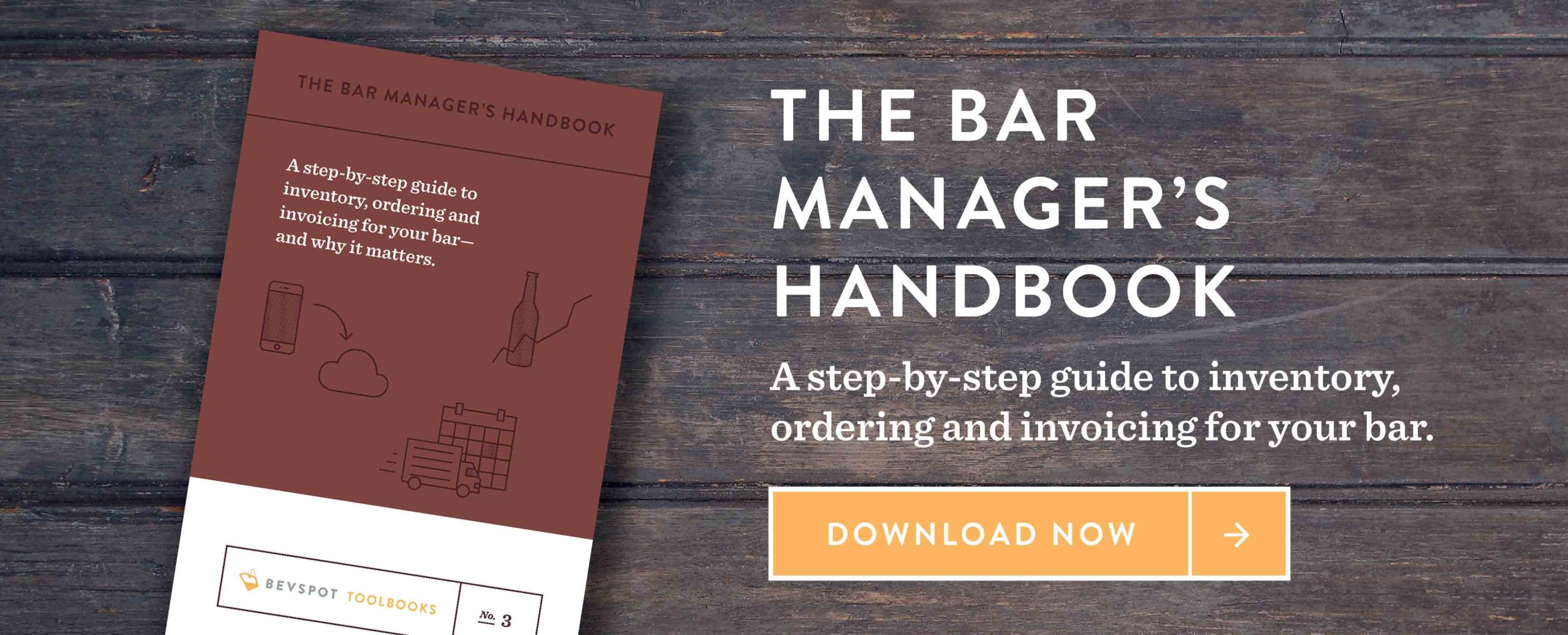
Bar Management, Bar Inventory, Bars, Management, Restaurant Management
15 Habits of a Successful Bar Manager
By Brie Shelley

By Brie Shelley

Whether you are a bar manager, beverage director, or general manager, you work hard to motivate your staff, keep your customers happy, maintain positive distributor relationships, stay on top of your bar’s sales and inventory data, maintain a clean establishment, bring in business, and reinforce the big picture of your bar.
This is such a diverse role, so we’ve put together a list of 15 good habits we recommend you pick up in order to successfully fulfill your bar manager duties.
Start Your Free Trial With Bevspot Today!
Holding recurring employee training sessions will give your staff members the opportunity to practice current skills and learn new ones. Routinely revisiting free-pour tests helps guarantee consistent drinks between your bartenders and better manage costs. Reviewing knife safety can limit risks of staff injury (insurance is expensive!), and sanitation practices have never been so top-of-mind among guests in light of COVID-19. Finally, taking time to talk with your team about the unique qualities of products you have in-house gives them the tools they need to talk to guests and upsell.
Staying on top of scheduling is about more than keeping your bar appropriately staffed but showing your team you respect their time. Work-life balance is especially important in the service industry to keep team members from getting burned out. Working with your team to establish a somewhat consistent schedule, can help them achieve this balance. Strive to have your schedule posted a minimum of four days out; ten is even better. The earlier you post, the more time you have to react to staffing shortcomings.
An earmark of successful managers in any industry is enabling open channels of communication between managers and their team. Be available to listen. If your team members feel you value their input, they’ll feel a sense of ownership in their work. This leads to them being less likely to leave your establishment or take part in fraudulent behavior. Your team is also an excellent resource for new ideas. Pick their brains for new cocktail menu items, creative promotions, or what your next craft beer selection should be. Being receptive doesn’t mean you have to enact every idea employees bring to you, but at least actively listen and encourage their input.

Becoming a manager isn’t the end of your training, but an invitation to much more. In addition to keeping on top of beverage industry trends, you should constantly be learning about the best bartending and bar management practices. Visit other bars to see how they function, attend bar managing seminars, stay up to date with new bar and restaurant technology, watch bar training videos, and read tactical articles to offer better training to your staff members and run a more successful establishment.
To be a successful bar manager, you shouldn’t be afraid to get your hands dirty. If you’re going to properly train and earn the respect of your staff, you need to know how to make all the drinks on your menu, work efficiently during busy hours, and deal with rowdy customers, firsthand. If there’s any part of your bar that you find yourself unfamiliar with, schedule your shifts in that area so you can learn through experience. Remember, as a manager, you should be able to perform and train your staff on any task at your bar.
Unless you work at an airport bar, regulars make up a substantial percentage of your overall revenue. To keep them coming back, it’s important to make them feel appreciated. Be sure to learn their names and what they usually like to drink. Finding some time to chat with them goes a long way but focus the conversation on them and not yourself. It never hurts to buy them a drink or an appetizer now and then. Don’t forget to pay attention to your other customers too.
As a bar manager, it’s easy to get caught up in overseeing your staff, chatting with regulars, or experimenting with new cocktails. Although leading your team is an essential aspect of your job, you should also take time to interact with all your customers. Ask patrons how they’re doing, how their experience has been, and greet regulars when they walk through the door. Be available to smooth out details, explain drink histories, or answer any of your customers’ questions. This also helps you be aware of what is going on in your bar, should you encounter issues like over-serving.
To protect the safety of your customers, your staff, and the general public, everyone in your establishment should be dedicated to serving alcohol responsibly. You should provide alcohol-awareness training to staff so they can confidently refuse to serve an overly intoxicated customer. In most circumstances, your bartenders and servers are in a better position to determine a customer’s sobriety. To empower them to exercise their judgment, you should always support their decision if they decide to cut off a customer.
The question shouldn’t be if you’re going to change your drink menu, but when. In the competitive bar and restaurant industry, it’s important to frequently switch your offerings to keep things fresh. Capture new guests and keep them coming back for more by following seasonal trends, using popular ingredients, and continuously modifying your cocktail list. “New” sells, but don’t mess with your classics. Your wine, spirit and beer representatives are a great resource when thinking about changing your menus and offerings. Speaking of reps…
Liquor reps are often working with monthly or quarterly placement quotas. If you hold purchasing power, it can be beneficial to build a relationship, beginning with helping them with product placement. A positive relationship can nurture free product, swag, and sporting event tickets, and bring your account to the top of their mind when they are looking to do special events or are aware of deep discounts. They may even help source special products or contribute to menu printing costs.
Although keeping up with bar industry news might just seem like another task to add to your to-do list, it’s important to know what’s going on in the industry. Staying informed will help you make better decisions and spot trends early on, giving you an edge over your competition. This is an important part of your development as a manager. As a bar manager, you’re also expected to be an expert in your field. When your bar staff looks to you for expertise, it’s important you know the facts so you can earn their trust and respect.
Organization is key to setting your team up for success. Consistent organization of your backbar and rail ensures your bartenders know where specific products are when they need them. The same goes for keeping your storage area organized. In the kitchen, it’s called “mise en place”, or “everything in its place.” Not only will it be easier for your team to find the products they need on a busy night, but ordering and inventory will be easier and significantly more efficient. These systems should extend to how you handle inventory and orders as well.
Taking regular liquor inventory is essential for running a profitable bar. It helps you identify theft, weed out poorly priced menu options, assess pouring accuracy, avoid 86’ing products, and understand inventory dollar usage information. Without efficient bar inventory, there’s no way to measure your bar’s success, making it extremely difficult (if not impossible) to manage.
To keep a fully stocked bar, you’re constantly placing orders and receiving deliveries. To keep your beverage costs down, make sure your invoices reflect your orders. When you receive a delivery, comb through the invoice while the delivery person is still present to make sure you got exactly what you ordered. This way, you won’t pay for products you didn’t receive, and you also won’t pay for excessive product that you didn’t order.
Although you might not like to think about it, your bartenders can drive up your costs by over-pouring, giving away free drinks, and stealing product. In fact, according to the National Restaurant Association, 75% of inventory shortages are due to employee theft. Although you don’t want to be overly paranoid, it’s a good idea to keep an eye out for fraudulent behavior. To protect your bar from theft, consider installing security cameras, reconciling cash drawers, routinely checking bartenders’ tabs, and using some of these other methods.
Developing these 15 habits as a bar manager will help you to effectively manage your staff members, keep your costs down, delight your customers, and run a successful establishment.
To stay up to date with industry news and best bar management practices, leave a comment and subscribe to our blog, below! If you have further questions about how to improve your beverage program, schedule a free bar consultation with one of our product specialists.
Schedule 15mins to chat with a product specialist
Start a FREE Trial Today! BevSpot offers full product education and account setup for all customers! No card Information needed!

Great article!
I think that managers get caught up in the minutia of running the floor, and day to day tasks and forget the larger picture of what their job really requires.
And as a TIPS Trainer I do appreciate #13!
This is a great reminder of what it really means to be a leader and manager! Great read!
Great article, shared it on my facebook page….especially like the ‘Advance Your Training’ part
Glad you like it, and thanks for sharing!
Appreciate the article. Although I’m only a bartender right now, I’m still learning and focused on what it means to actually know how to run a bar. Far too often I’m seeing managers that are supposed to be responsible for me and others not have the slightest idea and how things like the keg and tap system work. Cleaning, adjusting nitrogen and carbon dioxide etc.
Good info looking for more of the same
Cool stuff, thanx.
I would say that another important habit is to always be in the “know” about how to save money without being cheap. Having great insurance, like https://www.tabakinsurance.com/bar-and-tavern-insurance/, they recommend certain updates on older buildings to make structures safer or better lighting for patron safety.